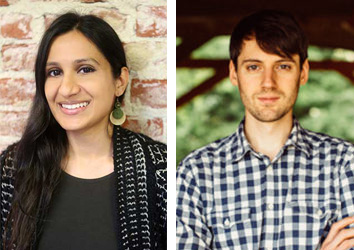The Vagelos Computational Science Center, in partnership with The Brown Institute for Media Innovation at Columbia Graduate School of Journalism, is excited to announce a significant new development at Barnard College—a pioneering course entitled “Writing with/on Computing,” slated to launch in Spring 2025. This course merges the disciplines of data science, visual arts, and narrative journalism, funded through a Collaboratory Fellow Fund grant at Columbia University. The course aims to prepare students to skillfully produce data-infused narratives, focusing on the transformative impact of technology on social systems. Through a unique curriculum, students at Barnard will learn to tell compelling stories about often overlooked or marginalized communities, using data as both a lens and a tool.
The course will be led by Dr. Saima Akhtar, Senior Associate Director of the Vagelos Computational Science Center (CSC) at Barnard College and Michael Krisch, Program Director at the Brown Institute. Dr. Akhtar is a computational social scientist with a background in architecture and software engineering. Prior to joining Barnard, Saima was a postdoctoral associate in the Yale University Department of Computer Science, where she managed digital cultural heritage preservation projects between the fields of computer science and architecture. At the Brown Institute, Michael Krisch manages grant programs and partnerships and leads a variety of research endeavors including Grades of Heat, an investigation into the thermal legacy of redlining in the US.
“Writing with/on Computing” will be offered in the Computer Science Department at Barnard Colleged and is rooted in project-based learning, where students will delve into the roles technology plays across various societal contexts. As an example, students may explore the intersection of technology with the criminal justice system, examining the biases within carceral technologies like predictive policing. Another segment might focus on healthcare algorithms and their impacts on decision-making processes that often disadvantage women of color. Through hands-on data analysis, coupled with ethical journalism practices, students will uncover and challenge the disparities embedded within these systems.
The course is not just about learning to analyze data but also about visual storytelling and creating interactive data visualizations. These skills are essential for translating complex data into narratives that resonate with a broad audience, making the quantitative aspects of stories as relatable as the qualitative ones. By integrating these techniques, the course will bridge the gap between hard data and human stories, equipping students with the comprehensive skills needed in today’s data-driven journalism landscape.
This course and partnership between the CSC and Brown highlights a shared commitment to innovative education in media and technology. We look forward to seeing the diverse, impactful stories our students will tell as they embark on this exciting educational journey.
